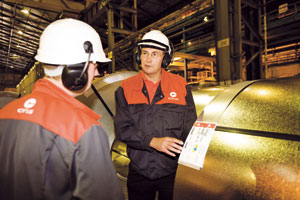Management Discussion & Analysis
j) Internal Controls & Systems
Tata Steel
The Company has in place adequate internal control systems and procedures commensurate with the size and nature of its business. The effectiveness of the internal controls is continuously monitored by the Corporate Audit Division of the Company. Corporate Audit’s main objective is to provide to the Audit Committee and the Board of Directors, an independent, objective and reasonable assurance of the adequacy and effectiveness of the organisation’s risk management, control and governance processes. Corporate Audit also assesses opportunities for improvement in business processes, systems & controls and may provide recommendations, designed to add-value to the organisation. It also follows up on the implementation of corrective actions and improvements in business processes after review by the Audit Committee and Senior Management.
The scope and authority of the Corporate Audit Division is derived from the Audit Charter approved by the Audit Committee. The Charter is designed in a manner that the Audit Plan is focused on the following objectives:
- Review of the identification and management of Risks.
- All operational and related activities are performed efficiently and effectively.
- Significant financial, managerial and operating information is relevant, accurate and reliable and is provided timely.
- Resources are acquired economically, used efficiently and safeguarded adequately.
- Employees’ actions are in accordance with the Company’s policies, procedures, Tata Code of Conduct and applicable laws and regulations.
- Significant legislative and regulatory provisions impacting the organisation are recognised and addressed appropriately.
- Opportunities identified during audits for improving management control, business targets and profitability, process efficiency and the organisation’s image are communicated to the appropriate level of management.
- Shareholders’ and other Stakeholders’ wealth and welfare are preserved, protected and enhanced.
The audit activities are undertaken as per the Annual Audit Plan developed by the Corporate Audit Division based on the risk profile of business processes/sub-processes of various functions. The Audit Plan is approved by the Audit Committee which regularly reviews compliance to the Plan.
During the year, the Audit Committee met regularly to review the reports submitted by the Corporate Audit Division. All significant audit observations and follow-up actions thereon are reported to the Audit Committee.
The Audit Committee also met the Company’s Statutory Auditors to ascertain their views on the adequacy of internal control systems in the Company and their observations on financial reports. The Audit Committee’s observations and suggestions were acted upon by the Management.
Corus Group
Corus has a well-established and substantial internal audit function that reports to the Director Finance on a day-to-day basis, but which also has a direct link with and access to the chairman of the Audit Committee who meets with the Director Audit several times each year. The Audit Committee receives reports from the internal audit function four times a year and also considers the terms of reference, plans and effectiveness of the function. The internal audit function works closely with the external auditors. It provides independent and objective assurance to the Board, the Audit Committee and the Executive Committee on the systems of internal control employed in Corus and provides a systematic, disciplined approach to evaluating and improving the effectiveness of risk management, control and governance procedures.
The Board of Directors is responsible for Corus’s system of internal control and reviewing its effectiveness.
There were no changes in internal control over financial reporting that occurred during the period under review that have materially affected or are reasonably likely to materially affect the internal control over financial reporting.
Corus’s system of internal control has been designed in order to provide the directors with reasonable assurance that its assets are safeguarded, that transactions are authorised and properly recorded and that material errors and irregularities are either prevented or would be detected within a timely period. However, no system of internal control can eliminate the risk of failure to achieve business objectives or provide absolute assurance against material misstatement or loss.
The Board meets regularly with a formal schedule of matters reserved to them for decision and has put in place an organisational structure with clear lines of responsibility defined and with appropriate delegation of authority and the Board receives regular reports from all committees. There are established procedures for planning, approval and monitoring of capital expenditure and information systems for monitoring Corus’s financial performance against approved budgets and forecasts. The Corporate Responsibility committee receives reports on health and safety issues and environmental audits carried out across Corus.
Corporate Governance of Corus Group
Day-to-day Management
The Board of TSUK (‘the Board’) oversees the day-to-day management of Corus, which is conducted through the Executive committee within the context of the overall strategy laid down by the Tata Steel Group. Corus is committed to high standards of corporate governance for which the Board of Directors is accountable.

 Review of the identification and management
of Risks.
Review of the identification and management
of Risks.